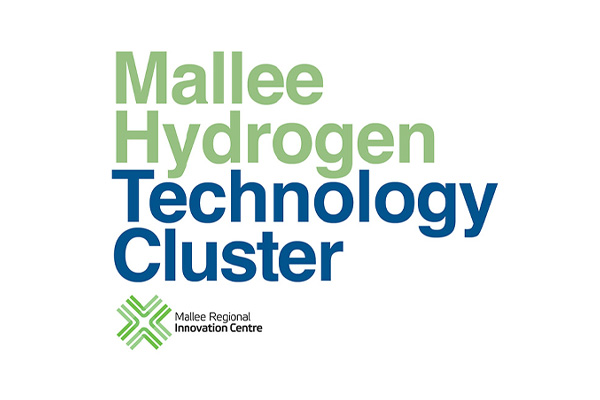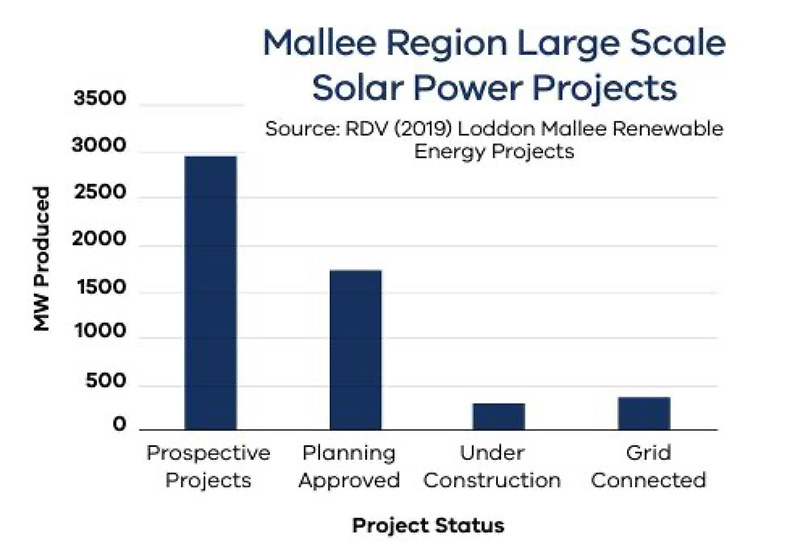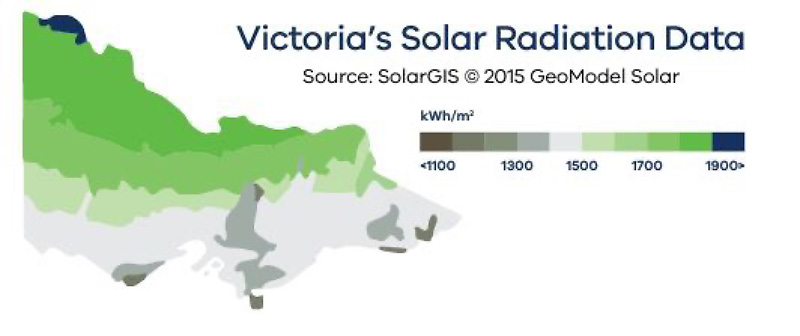Mallee Hydrogen Technology Cluster
Mallee Regional Innovation Centre
Led by the Mallee Regional Innovation Centre, the Mallee Hydrogen Technology Cluster is dedicated to the accelerating a hydrogen ecosystem, fostering innovation and research, building skills, capability and attracting investment for the development of a hydrogen industry.
Headquartered in Mildura in the North-West of Victoria, the Mallee region is known as home to an inland port, that intersects at a strategic freight route at a tri-state region.
The Cluster was formed by the Mallee Regional Innovation Centre with representation of founding members from Mildura Regional Development, GTS Freight and Logistics Group and Regional Development Victoria.
The Mallee region is well placed to develop a hydrogen supply chain and become one of Australia’s largest producers of hydrogen due to its high solar radiation and capacity for renewable energy, which is supported by the existing infrastructure, including rail routes to port, Victoria’s second busiest regional passenger airport, and proximity to domestic demand centres.

This initiative was seeded by NERA in 2020 in order to build the capability needed to establish Australia as a world leader in the hydrogen value chain.

By leveraging the region’s considerable renewable energy capacity, a competitive hydrogen industry can be established in the Mallee.
The Mallee’s Competitive Advantage
The Mallee Regional Innovation Centre has been investigating the suitability of the region for hydrogen industry development since 2019.
The Mallee provides a number of competitive advantages in relation to hosting a hydrogen industry.
This includes:
- A rich solar resource for renewable energy and hydrogen production and seasonal storage
- Concentrated agriculture and industrial infrastructure which could benefit from heavy duty hydrogen powered transport as well as back up generation
- Strategically positioned on the national freight corridor for transport and logistic routes
- Large biomass resource which can complement hydrogen use for power generation
- Access to transport infrastructure for a hydrogen export market
Plentiful Solar Radiation
Utility-scale solar farms are being rolled out throughout the north west of Victoria. Planned grid augmentation will help unlock our abundant natural resources well into the future.

A Growing Utility Scale Solar Farm Industry
Currently the Mallee supports 19 large-scale solar projects that are either operating, being built or with planning permission approved.
These Solar Farms provide a combined energy capacity of 2380MW and are valued at over $2.8 billion.
A further 13 prospective solar farm developments have an estimated regional energy capacity of 2,050 MW. Combined, they have an estimated total energy capacity of 5,280MW.

Pre-existing Infrastructure allowing export of Hydrogen from the region
From Mildura there is a standard gauge freight rail connection to the ports of Melbourne, Geelong and Portland and a pre-existing natural gas pipeline to Adelaide. If peak demand electricity was to be supplied via stored hydrogen, then the Mallee is connected into the National Electricity Market through two 220kV transmission lines to Ballarat and Melbourne and interconnectors to NSW and SA.
The region has been advocating for upgrades to both the electricity distribution network and freight rail network with recent commitments from the Commonwealth and State Governments for the KerangLink electricity interconnector and both governments have committed to make improvements to the Murray Basin Freight Rail network.
Solar Electricity Prices to Continue Falling
The highest input cost in the production of green hydrogen is the renewable energy required to drive electrolysis.
The CSIRO is predicting that by the time the hydrogen economy matures (2030 – 2050), large scale solar electricity production will have become cheaper than wind generated electricity, making the Mallee the most economical producer of green hydrogen in Victoria.
Plentiful Sources of Biomass
The strong horticultural sector within the Mallee region provides a range of biomass products suitable as feedstock for conversion into green, high value energy products.
This includes the production of renewable, drop in fuels (diesel) and gases (including hydrogen) to transition the transport sector to hydrogen.
This also allows the agricultural sector to immediately benefit from low carbon, renewable fuel to power trucks, trains, farm machinery, hydrogen fuel cell forklifts and stationary energy on its way to hydrogen future as production increases and machinery options emerge.
Cheap Land and Room for Everyone
In comparison to other parts of Victoria that are more densely populated, there is greater acceptance of the role played by new industry developments in creating jobs and wealth for the region. This is evidenced by the lower rate of planning permit objections that have been received for the solar farm developments in the Mallee compared to other parts of the state.
View the Hydrogen in the Victoria Mallee prospectus here (PDF)
Australian Renewable Energy Agency (ARENA)
We support the global transition to net zero emissions by accelerating the pace of pre-commercial innovation, to the benefit of Australian consumers, businesses and workers.
Our purpose is to support improvements in the competitiveness of renewable energy and enabling technologies, increase the supply of renewable energy in Australia, and to facilitate the achievement of Australia’s greenhouse gas emissions targets by providing financial assistance and sharing knowledge to accelerate innovation that benefits all Australians.
Australian Hydrogen Council
The Australian Hydrogen Council is the peak body for the hydrogen industry, with members from across the hydrogen value chain.
Regional Hydrogen Technology Clusters (NERA – National Energy Resources Australia)
H2TCA is a network of hydrogen technology clusters that spans across Australia to enable the vital connection, collaboration and alignment of action across the country to support the emerging hydrogen industry.
Regional Hydrogen Technology Clusters (NERA – National Energy Resources Australia)
Victorian Hydrogen Hub
Led by Swinburne University of Technology in partnership with CSIRO and Germany’s ARENA2036 factory, the Victorian Hydrogen Hub (VH2) brings together researchers, industry partners and business to drive the implementation of the hydrogen economy.
AusH2 - Australia's Hydrogen Opportunities Tool GeoSciences Australia
AusH2 tracks hydrogen projects under development, construction or operating in Australia. You can access over 7,000 datasets and run your own hydrogen project feasibility assessments using the Hydrogen Economic Fairways Tool (HEFT).
AusH2 - Australia's Hydrogen Opportunities Tool GeoSciences Australia
State of Hydrogen 2022
The 2022 report shows that Australia has the resources, technical skills, and track record with international partners to seize this opportunity and become a global hydrogen powerhouse.
The report also found that while local industry was advancing broadly, it would need to accelerate early actions identified in the National Hydrogen Strategy to compete internationally.
Australian Government - Department of Climate Change, Energy, the Environment and Water
National Hydrogen Infrastructure Assessment
The Australian Government has completed Australia’s first assessment of infrastructure requirements for hydrogen through to 2050.
The National Hydrogen Infrastructure Assessment aims to support targeted and coordinated infrastructure investment, through identifying infrastructure needs and gaps; and where investments could be best prioritised to achieve maximum impact.
National Hydrogen Infrastructure Assessment
Australian Government - Department of Climate Change, Energy, the Environment and Water
HyResource
HyResource is a collaborative knowledge sharing resource supporting the development of Australia’s hydrogen industry.
The Hydrogen Knowledge Centre
This publicly available platform aims to develop new or connect existing hydrogen knowledge resources, allowing users to access reliable and relevant information from hydrogen industry projects, research activity and key organisations.
The Hydrogen Knowledge Centre is a key pillar of CSIRO’s Hydrogen Industry Mission.
The Department of Energy, Environment and Climate Action
Renewable hydrogen offers the potential as a clean, safe and reliable fuel source. Hydrogen production is becoming not only cleaner but cheaper. It could sustainably power Victoria's transport, agriculture and manufacturing sectors. While creating jobs across our state.
The Department of Energy, Environment and Climate Action
Victorian State Government
Landmark study reveals potential for Australia's hydrogen industry to generate $40 billion in domestic GVA by 2040.
Australia's hydrogen industry has the potential to generate $40 billion in domestic GVA and create 58,000-72,000 jobs per year by 2040, according to a new report by NERA and Arup.
Final modelling results
The Net Zero Australia project has released its final modelling results of pathways to net zero. The Net Zero partnership includes Centre partner the University of Melbourne.
Providing regulatory clarity to support development of Australia's hydrogen industry
To support development of Australia’s hydrogen industry and provide greater clarity around regulatory pathways, the Commonwealth, states, and territories are drafting National Hydrogen Codes of Best Practice.
Powering Up: Seizing Australia's Hydrogen Opportunity by 2040
Completed by National Energy Resources Australia (NERA) and Arup, Powering Up is a landmark economic study of the hydrogen supply chain needed to support Australia’s future hydrogen economy by 2040.
This is the first study to comprehensively analyse Australia's supply chain and highlight the hydrogen equipment, technology and services (HETS) sector opportunity from a national -perspective.
-
Victorian Mallee Hydrogen Prospectus
-
Hydrogen Roadmap - Mallee Region
-
GHD Mallee Hydrogen Technology Cluster Mobility Project Plan
-
GHD Mallee Hydrogen Technology Cluster Project Assessment
-
Green hydrogen in the Mallee
-
Hydrogen Council Readiness Program
-
Mallee Hydrogen Technology Cluster Industry Information Session – Swan Hill
-
Victorian Hydrogen Clusters Forum
-
Master student project – Sector Coupling Map
-
Hydrogen and water in the Mallee
-
Virtual visiting delegation
About us
-
Focus areas
The cluster has undertaken a range of activities across our focus areas.
-
Our region
An ambitious renewables sector - The region aims to become the solar capital of Australia through large-scale solar farming.
-
Steering committee
The Steering Committee provides advice, ensures delivery of project outputs and the achievement of project outcomes.